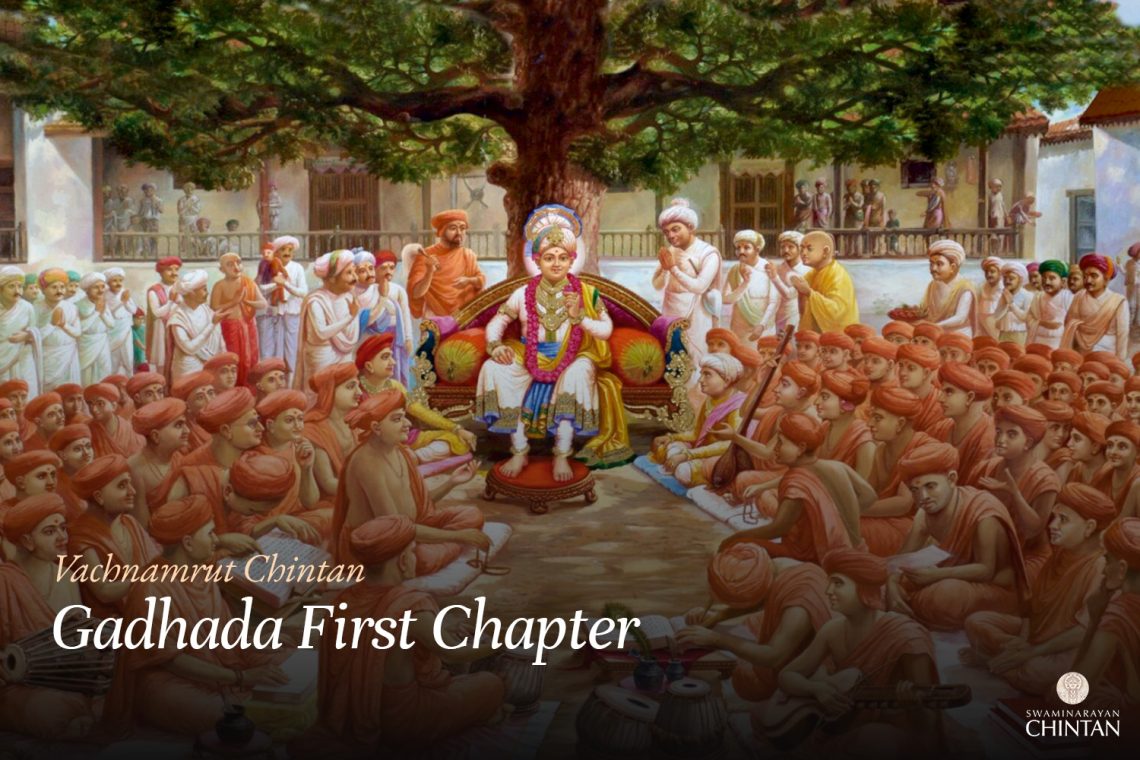Central Insights:
- A way or means to safeguard one’s own Salvation.
Key Points:
- By blessings from the best devotee of God, one gains strength to walk on the path of salvation (Kalyan) and intellectual abilities to safeguard Kalyan.
- By displeasing the heart of a devotee of God, one’s Kalyan is destroyed and the intelligence becomes evil.
Explanation
Then, addressing the Santo, Shrījī Maharaj said, “Either you ask Me a question or I will ask you all a question.” Thereupon, the Santo said, ‘You may ask, Maharaj.”
Then Shrījī Maharaj replies, “There is an individual who, despite having limited intellect, never refrains from making efforts for his own salvation. And there’s another individual with abundant intellect, capable of finding faults even in the greatest of beings, yet doesn’t tread on the path of salvation. Why is that?” Santo tried to give a satisfactory answer but they were unable to give one. Then Maharaj responded, “The latter might possess intellect, but it’s tainted. Hence, he cannot walk the path of salvation.”
The nurturing and degradation of the path to salvation are distinct. Maharaj illustrated, “Consider the wholesome milk of a buffalo mixed with sugar. If a drop of snake venom falls into it, both the milk and sugar turn into poison. Similarly, when one is advised by a doctor to consume medicine or a tonic with milk, the amount of milk might be abundant compared to the medicine or tonic. Yet, the medicine or tonic exerts its effect first, while the milk follows its lead. Here, our intellect is likened to the milk, while satisfaction or dissatisfaction is influenced by the external agent.
The safeguarding or degradation of the path to salvation isn’t merely dictated by intellect but by appreciating or demeaning the virtues of revered saints or God. Such appreciation or disdain leaves lasting impressions on our intellect. Drawing from the analogy of milk and venom, the milk gets transformed into venom. Similarly, if one possesses untainted and even if minimal intellect, they won’t retract from efforts towards salvation. Thus, on the path to salvation, pure and untainted intellect is more essential than abundant intellect. If the intellect isn’t abundant, it’s still manageable. However, if one possesses abundant intellect but lacks the blessings of genuine devotees of God, it won’t be beneficial; rather, it can be more damaging.
Then Muktaanand Swami asked, “O Maharaj! Is there ever a time when one cannot face God?” Maharaj replied, “Once one is consumed by betrayal and is invaded by demonic tendencies, they cannot face God.”
Then Muktaanand Swami asked again, “O Maharaj! If there’s a way to avoid such demonic tendencies, please tell us?” Sadhu Mukanand Swami said, “It lies in the company of the righteous. Look at the compassion and mercy Swami has for sinners like us, who repeatedly ask questions for our own well-being.”
Maharaj then stated, “Firstly, anger; secondly, pride; thirdly, jealousy; and fourthly, deceit. If none of these four are harbored towards God or saints, then one’s intellect does not become demonic. However, if even one of these is present, the intellect becomes demonic. Maharaj emphasized not to harbor these four emotions towards God or great saints. But in reality, that’s probably where they are most required.
When does anger arise? It’s when one’s expectations aren’t met. The higher the expectation, especially from elders, the more it’s likely to be unfulfilled. Younger ones can easily meet those expectations. The elders might not always. Instead, they might hinder your expectations, which is the primary reason for anger. Maharaj advises not to get angry. Many times, societal norms prevent a person from outwardly expressing their anger, but they might harbor resentment internally. This leads to passive aggression, deceit, envy, neglect of duties, deliberate mistakes, etc. All these are manifestations of anger. If this exists, the intellect turns demonic.
The concept of pride is similar. The younger ones might constantly appease one’s pride, but the elders become the target when one feels their pride is hurt or not duly recognized. This leads to a chance of demonic tendencies emerging.
Jealousy too emerges when one sees their peers or society doing better than them. The need for deceit might not arise with younger ones. With elders, there’s a need to put on a facade. Outwardly one might be respectful, but inwardly there’s resentment.So, where Maharaj has warned against these pitfalls, that’s precisely where situations arise to test these qualities. If the goal is true spiritual progress, then one must overcome these flaws. Otherwise, with intellect clouded by these ten negative aspects, one cannot progress. Maharaj gives the example of Jay and Vijay, who were gatekeepers of the divine abode but fell from grace because of their pride when dealing with the sage Sanak and his brothers, leading them to adopt demonic tendencies. Once one adopts such tendencies, they only see faults in devotees and virtues in adversaries. Subsequently, in their various incarnations, they either become part of Lord Shiva’s entourage or demon kings, always opposing God and Santos.
Glossary
| Demonic Tendencies – Negative traits that oppose God and spiritual values These include jealousy, hatred, hypocrisy, and deceit. A person may appear religious but inwardly harbor these tendencies, which hinder spiritual progress and devotion to God. |
| Buddhi – Mental Discrimination The ability to differentiate between right and wrong. |
| Kalyan – liberation from the cycle of birth and death and reaching divine abode of God. |
| Mumukshu – Seeker of liberation (Moksha) |
| Passive Aggression – Hidden resistance or indirect opposition |

